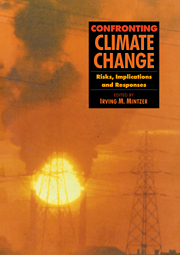Book contents
- Frontmatter
- Contents
- Foreword
- Acknowledgements
- List of Reviewers
- 1 Living in a Warming World
- I The Science of Climate Change
- II Impacts of Global Climate Change
- III Energy Use and Technology
- IV Economics and the Role of Institutions
- 15 The Economics of Near-Term Reductions in Greenhouse Gases
- 16 “Wait and See” versus “No Regrets”: Comparing the Costs of Economic Strategies
- 17 International Organisations in a Warming World: Building a Global Climate Regime
- 18 Modifying the Mandate of Existing Institutions: NGOs
- 19 Modifying the Mandate of Existing Institutions: Corporations
- 20 International Trade, Technology Transfer and Climate Change
- V Equity Considerations and Future Negotiations
- Annex I
- Annex II
- Glossary
- Index
17 - International Organisations in a Warming World: Building a Global Climate Regime
Published online by Cambridge University Press: 06 January 2010
- Frontmatter
- Contents
- Foreword
- Acknowledgements
- List of Reviewers
- 1 Living in a Warming World
- I The Science of Climate Change
- II Impacts of Global Climate Change
- III Energy Use and Technology
- IV Economics and the Role of Institutions
- 15 The Economics of Near-Term Reductions in Greenhouse Gases
- 16 “Wait and See” versus “No Regrets”: Comparing the Costs of Economic Strategies
- 17 International Organisations in a Warming World: Building a Global Climate Regime
- 18 Modifying the Mandate of Existing Institutions: NGOs
- 19 Modifying the Mandate of Existing Institutions: Corporations
- 20 International Trade, Technology Transfer and Climate Change
- V Equity Considerations and Future Negotiations
- Annex I
- Annex II
- Glossary
- Index
Summary
Editor's Introduction
In 1972, the United Nations Conference on the Human Environment (UNCHE) was held in Stockholm, Sweden. This meeting — the first global conference to focus on negative human impacts on the environment—led directly to the formation of a new member of the UN family, the United Nations Environment Programme. In the 20 years since, many meetings have been held to address environmental issues; extended negotiations have led to several important international agreements designed to protect environmental quality, and a number of international organisations have emerged as forums for consideration of ecological problems that span national boundaries.
But as the efforts evolved into negotiations over an international framework convention on climate change, a variety of special challenges emerged for traditional institutions trying to establish a cooperative international regime. Among the complicating factors are: (1) the presence of persistent scientific uncertainties, including a pervasive and continuing ignorance about the timing, severity and regional distribution of effects of climate change; (2) a wide separation both in time and space between those who benefit from industrial activity, and those who must absorb the damages; and (3) a protracted lag of unknown duration between the time at which a response strategy is implemented and the expected observation of its salutary effects.
In addition, because the response strategies could affect such a wide variety of economically important activities (both in industrial and developing countries), it is not possible to work out a simple and quiet arrangement among a few key interest groups familiar with the problem. Rather, achieving a practical and equitable agreement will require the participation of many different stakeholder groups.
- Type
- Chapter
- Information
- Confronting Climate ChangeRisks, Implications and Responses, pp. 253 - 264Publisher: Cambridge University PressPrint publication year: 1992
- 2
- Cited by

